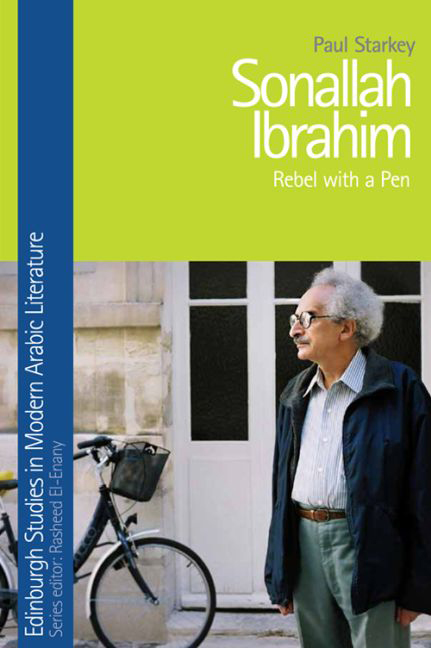Book contents
- Frontmatter
- Contents
- Series Editor's Foreword
- Preface
- 1 Introduction: Background and Context
- 2 Rebel with a Pen
- 3 Cairo Prison: Tilka al-raʾiha (1966)
- 4 Michelangelo and the Dam: Najmat Aghustus (1974)
- 5 CocaColaland: al-Lajna (1981)
- 6 War in Lebanon: Bayrut, Bayrut (1984)
- 7 Consumer Society: Dhat (1992)
- 8 Prison of Dishonour: Sharaf (1997)
- 9 Widening Horizons (1): Sex, Memory and Revolution: Warda (2000)
- 10 Widening Horizons (2): In the Land of the Capitalists: Amrikanli (Amri Kan Li) (2003)
- 11 Return to Childhood: al-Talassus (2007)
- 12 The French Connection: al-ʿImama wa-al-Qubbaʿa (2008) and al-Qanun al-Faransi (2008)
- 13 Filling a Gap: al-Jalid (2011)
- 14 Epilogue
- Bibliography
- Index
6 - War in Lebanon: Bayrut, Bayrut (1984)
Published online by Cambridge University Press: 23 September 2017
- Frontmatter
- Contents
- Series Editor's Foreword
- Preface
- 1 Introduction: Background and Context
- 2 Rebel with a Pen
- 3 Cairo Prison: Tilka al-raʾiha (1966)
- 4 Michelangelo and the Dam: Najmat Aghustus (1974)
- 5 CocaColaland: al-Lajna (1981)
- 6 War in Lebanon: Bayrut, Bayrut (1984)
- 7 Consumer Society: Dhat (1992)
- 8 Prison of Dishonour: Sharaf (1997)
- 9 Widening Horizons (1): Sex, Memory and Revolution: Warda (2000)
- 10 Widening Horizons (2): In the Land of the Capitalists: Amrikanli (Amri Kan Li) (2003)
- 11 Return to Childhood: al-Talassus (2007)
- 12 The French Connection: al-ʿImama wa-al-Qubbaʿa (2008) and al-Qanun al-Faransi (2008)
- 13 Filling a Gap: al-Jalid (2011)
- 14 Epilogue
- Bibliography
- Index
Summary
Sonallah Ibrahim's next novel, Bayrut, Bayrut (Beirut, Beirut), published in 1984, picks up and develops, in the context of the Lebanese Civil War of 1975–90, a number of themes and techniques that had been hinted at in his previous works. The geographical setting of the work is itself of some interest, for Egyptian writers in general have not been notable for their interest in other parts of the Arab world. Indeed, it is probably little exaggeration to say that, with the conspicuous exception of the Palestine-Israel dispute, Arab writers in general have shown a marked reluctance to interest themselves in the problems of the region outside their own particular countries. Although the Lebanese war itself provides a proportion of the material for the novel, however, this is by no means the only theme running through the work, and problems of publishing in the Arab world (a subject on which the author could bring to bear significant personal experience) clearly emerge as one of the narrator's other main preoccupations.
Publication and Translations
The novel was written during the period April 1982 to December 1983 and first published in Cairo in 1984 by the author's favourite Cairo publishing house, Dar al-Mustaqbal al-ʿArabi; it was subsequently reprinted in 1988 and on several subsequent occasions. An English translation by Chip Rossetti was published by Bloomsbury Qatar Foundation Publishing in September 2014 under the title Beirut, Beirut; to my knowledge, there are no other foreign-language translations.
Background
Sonallah Ibrahim's interest in the Lebanese Civil War appears to have been initially sparked by the difficulties of publishing his work in Egypt – a situation that had plagued him since the writing of Tilka al-raʾiha, and which prompted him to visit Lebanon in 1979. Then as now, the country enjoyed a reputation as one of the most liberal publishing centres in the Arab world, but for some four years had been in the grip of a complex civil war that was to last until 1990. Finding himself in the middle of the conflict, and in an attempt to understand what was happening, the author began to research and document the events around him, and it was this research that formed the basis for his subsequent novel.
- Type
- Chapter
- Information
- Sonallah IbrahimRebel with a Pen, pp. 86 - 103Publisher: Edinburgh University PressPrint publication year: 2016



